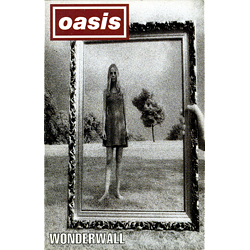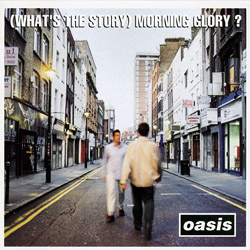"Wonderwall" CD track (Epic/1995)

"Wonderwall" U.S. cassette single (Epic/1995)*
 *volume normalized
*volume normalized
And the winner is: CD track.
I realize that this is one of the most popular singles of the 90s, but I have to be honest - I've never really liked "Wonderwall" all that much. Nevertheless, I do have a copy of the cassette single picked up in or around 1995, and over the years I have also ended up with a copy of the (What's The Story) Morning Glory? CD in my collection. So how do the two releases of this song compare, given that Morning Glory is practically a poster child for the Loudness War and one of the earliest major examples of digital brickwall limiting to hit the market? Well, a simple look at the waveforms tells a story here. The effects of the brickwall limiting on the compact disc are very apparent and obvious, with the entire waveform fairly squared off on top and bottom. Interestingly, the mastering levels on the CD version (and on the CD in general) are actually quite reasonable, coming in at an average RMS of about -15 dB. It's the mix itself that's too loud, with an over-emphasis on pushing EQ right up to the edge of distortion at the expense of dynamics. So it would seem here that the cassette track is superior, but there's a catch - the two mixes sound dramatically different. The CD version sounds (to my ears at least) harsh, while the single version, by contrast, has a thicker sound with too much bass and too much emphasis in the mid/bass frequencies. Choosing a winner for this comparison is a bit challenging since I don't like either version very much and I dislike the song to begin with, but I'm going to go with the CD track over the cassette. The single is just too bass heavy and the vocal a bit too buried by comparison with the regular album mix. And, although (What's the Story) Morning Glory? is notorious for being an early example of the brickwall limiting that would become so unfortunately commonplace in the industry, by comparison with today's releases it actually comes across as surprisingly conservative and dynamic.



 *volume normalized
*volume normalized